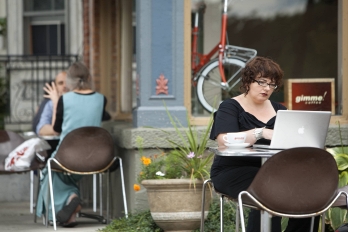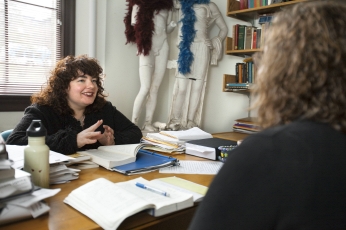COVER STORY
In the humanities, classrooms are labs and students are collaborators
(Page 2 of 4)Similar scenes are repeated every day in humanities classrooms at Cornell, where students share their professors' research in exciting, unexpected ways. Indeed, in the humanities the classroom is as much laboratory as a place of learning.
To the nonspecialist, the question of how humanists approach the scholarship on which tenure and academic reputations rest may not be as clear as in the sciences, where researchers spend so much time in the lab or in the field. But as Peter Lepage, the Harold Tanner Dean of the College of Arts and Sciences, points out, "teaching often supports research in the humanities in a much more direct way than in the sciences."
Issues of interpretation and subjectivity are front and center in humanities classrooms, so that faculty have opportunities to address their research even in freshman courses.

Raskolnikov at a local Gimme Coffee, working on a book project examining the kinds of revelations made by elaborate apologies, which are a mode all their own in medieval studies. See larger image
And the ideas emerging from Cornell's humanities classrooms are probably more diverse than at many other institutions because of the high percentage of students from Cornell's other six schools who also take classes in the College of Arts and Sciences. These students contribute perspectives from outside the humanities that enrich classroom discussion and encourage unconventional thinking.
The synergy between teacher and student works on behalf of the student, too. As Walter Cohen, associate dean of the College of Arts and Sciences, says, "Ideally the student gets my excitement and enthusiasm about the material, my sense of discovery that's supposed to be contagious. When this is working well, when we're discussing and debating ideas, then I'm modeling how one teaches and also how one approaches a research problem."
Laurent Dubreuil, professor of Romance studies, describes his experience of humanities classrooms as essentially Socratic, with teacher and student constructing the class together.
Setting the stage for a classroom-as-laboratory begins with the course syllabus. Before deciding on material, Raskolnikov considers how it will fit with her own interests and with what the students need to learn. The syllabus for her freshman writing seminar, "Apologizing Well, From Socrates to the Present," for example, went through six drafts. First she put in a Chaucer poem, then she deleted it. Socrates remained a mainstay, and at the last minute she added "Angels in America," Tony Kushner's Pulitzer Prize-winning play that raises questions of forgiveness reminiscent of "The Winter's Tale," another work that shaped the syllabus from its inception. Including a contemporary play like Kushner's in the syllabus is an experiment for Raskolnikov, a way to explore whether her book should be only about the Middle Ages or if it might include the way the meaning of apologies changes over the history of English literature.
For her freshman class, though, she includes an assignment that lets students bring in recent apologies of interest to them, thus including discussions of such public figures as Tiger Woods and the controversies surrounding them in her syllabus.

Raskolnikov chats with a student in her Goldwin Smith Hall office. See larger image
"I craft my classes in terms of questions that excite me and that I hope will excite students, too," explains Raskolnikov. "On a day-to-day, moment-by-moment basis, however, I don't need to pull the class into my research – we go where the texts take us, and class is driven by my students' questions and ideas, and by moments of insight that these bring about."
But Joseph Mansky '12 appreciates it when course content includes a professor's work. "I think it's great because we're being taught by some of the best scholars in the field," he says.
- View entire story as one page -